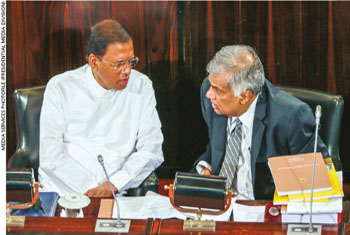POLITICAL REFORM
BRIDGING DIFFERENCES FOR HARMONY
Dr. Jehan Perera is confident that constitutional reform will eventuate

The formation of a national unity government between the United National Party (UNP) and the Sri Lanka Freedom Party (SLFP) offered a real possibility of constitutional change to overcome past failures.
Ongoing debates on constitutional reform present two options: that of repealing the existing 1978 constitution and replacing it; or limiting amendments to a degree that would avoid a referendum.
The need to revise the constitution follows two election pledges – i.e. to abolish the current executive presidential system; and increase devolution to the provinces and implement power sharing between ethnic communities to foster reconciliation by addressing Sri Lanka’s ‘ethnic conflict.’
Despite frustration with the slow progress of the country on multiple fronts, political reform could be the key area of success for the government. Recent events suggest that the government is gearing itself for substantial constitutional reform that includes a referendum as the best way to demonstrate to the people that it is outcome oriented and capable.
The postponement of provincial council elections may be viewed in this light. Holding local or provincial elections at this time will pit political parties in the government against one another, which is the unstated reason for postponing the polls until constitutional reform takes place.
Being a combination of two political parties that have been traditional rivals, in ascertaining what the government is capable of doing, it’s important not to overload it with hopeful assumptions of its problem solving abilities.
Of course, the government inherited a polity that is divided in terms of political affiliation and ethno-religious identity. It is a power sharing government – one in which there is not one centre of power but two in the form of the president and prime minister, and the two political parties they head.
Despite these weaknesses, the UNP-SLFP alliance that led to the national unity government is unique for Sri Lanka. It is also rare for any part of the world that two parties in opposition – that have alternatively ruled the country since independence – should form a coalition.
The political conditions in Sri Lanka today are optimal to achieve a political solution to the ‘ethnic conflict’ in terms of the availability of numbers in parliament. And the ability of the UNP and SLFP to secure a two-thirds majority in parliament is buttressed by the fact that ethnic minority parties are united in their support for the national unity government, which presents a number of strengths.
President Maithripala Sirisena plays a significant role in managing the opposition to the constitutional reform process by Buddhist religious factions, which is indicative of his importance to the government. The president’s political strength lies in his ability to connect with the ethos of the Sinhalese majority. And it’s this affinity that enables him to be trusted by Buddhist prelates and the majority Sinhalese population.
The president’s meeting with the mahanayakas of the Buddhist sangha in Kandy may prove to be pivotal in the constitutional reform process. Only a week prior, the mahanayakas had issued a joint statement that there was no need for a new constitution, which they felt would lead to more conflict in the country.
As the Buddhist clergy is highly influential among the 70 percent of the population that’s identified as Sinhalese-Buddhist, this threatened to be a major setback to the government’s constitutional reform process.
At present, the constitutional reform process is being driven by the UNP component of the government headed by Prime Minister Ranil Wickremesinghe who has announced his resolve to go ahead with it. The PM has the wide learning and cosmopolitan outlook to appreciate the constitutional mechanisms and compromises that are needed to govern a multiethnic, multi-religious and plural society.
The president’s commitment to take the message to the people is necessary for it to be accepted by the majority. It will also ensure the support of the SLFP group in parliament that accepts his leadership. This is why the president, prime minister and their respective parties must continue to work in partnership.
Indeed, the passage of the new constitution following a victory at a referendum would provide an early opportunity for the two parties to renegotiate their alliance beyond 2020. This could pave the way for elections in which the two parties work together rather than at cross-purposes.






At the moment, to be frank what worries most people, has little do with the impending constitutional reforms; on the contrary, we’re far more worried about the blatant dichotomy of the rule of law – one for the ‘haves and have yachts’ and one for the ‘have not’s. This is certainly not a salubrious state of affairs and is a fertile breeding ground for possible social uprisings against the government.
The Premier with his wide learning and cosmopolitan outlook should be in touch with the grassroots and take immediate measures to correct these critical social fundamentals. Or else, by and by, the nation will slide into lawlessness and chaos.
Speaking about constitutional reforms, first and foremost, the hoi polloi don’t understand the political argot that’s being bandied about the matter, so most of us are clueless about the possible implications of those constitutional reforms. Besides, we’re wary about it because it may all be aligned to serve their vested interests rather than the public welfare. We’re waiting to see how all that is going to unfold.